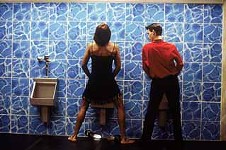Paris Was a Woman
1995, NR, 75 min. Directed by Greta Schiller. Voices by Juliet Stevenson, Maureen All, Gillian Hanna, Margaret Robertson.
REVIEWED By Russell Smith, Fri., Dec. 6, 1996
The Parisian literary and artistic community of the 1920s and '30s wasn't the first in which women played central roles. But as director Schiller and writer Andrea Weiss remind us in Paris Was a Woman, it obliterated centuries of conventional wisdom about the role of females in the creative process. Not only were these women (including writers Gertrude Stein, Janet Flanner, and Djuna Barnes, publisher Sylvia Beach, and photographer Gisele Freund, among many others) not content to function as muses for male artists or as craftsmanlike exemplars of traditional forms, they were stylistic revolutionaries of historic stature. France, longtime cradle of the avant-garde, was a natural magnet for women of the post-World War I years, who constituted the first graduating class of the late 19th-century feminist movement. Like Ernest Hemingway, James Joyce, and other male expats who gravitated to Paris at the time, these young women were trying to redefine the form, function, and symbolic vocabulary of art. In this sense, the salon-and-cafe culture of the day was remarkably androgynous. But unlike the guys, many of the female artists -- a goodly percentage of whom were lesbians -- were also extending their new freedom into the terra incognita of sexual liberation. This latter point emerges as a major focus of the film, with the romantic connections and travails of the artists, Barnes in particular, sometimes threatening to obscure the more lastingly relevant and interesting aspects of their lives. But no matter how far afield the blithely elliptical narrative of Paris may roam, it always finds its way back to the main road. Gracefully blending off-the-cuff interviews -- some new, some archival -- with Freund, Beach, and other veterans of the scene with scholarly commentary from author Shari Benstock and educator Catherine Stimpson, Schiller manages to breathe real life and heat into her iconic subjects. A wealth of fascinating period footage and still photography adds to the sense that, as the film's recurring Paris city map captions say, Vous etes ici. Apart from its amorphous structure, my only real quibble with this film is that Schiller passes up an obvious chance to link the achievements of these bold women with those of their modern artistic progeny of both genders. But she does succeed at one goal I suspect was foremost in her mind: restoring some of the sense of adventure and limitless possibility that the women's movement seems to have lost in recent years.
A note to readers: Bold and uncensored, The Austin Chronicle has been Austin’s independent news source for over 40 years, expressing the community’s political and environmental concerns and supporting its active cultural scene. Now more than ever, we need your support to continue supplying Austin with independent, free press. If real news is important to you, please consider making a donation of $5, $10 or whatever you can afford, to help keep our journalism on stands.
Paris Was a Woman, Greta Schiller








